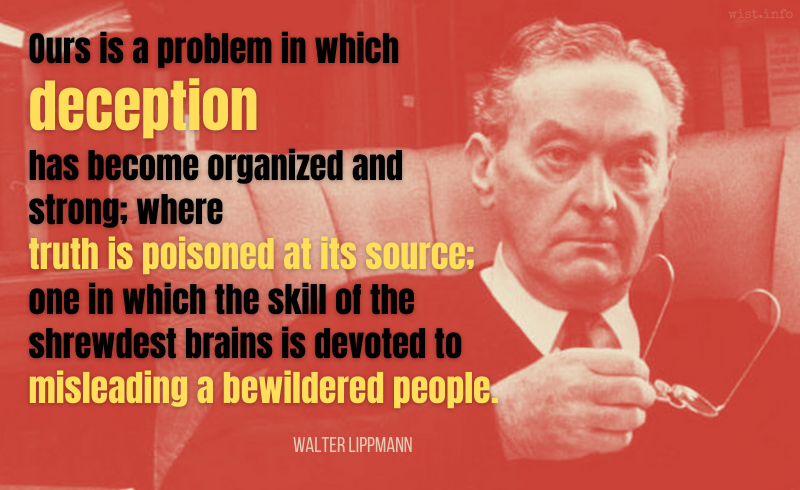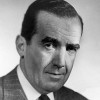It is a melancholy truth that a suppression of the press could not more compleatly deprive the nation of its benefits, than is done by its abandoned prostitution to falsehood. Nothing can now be believed which is seen in a newspaper. Truth itself becomes suspicious by being put into that polluted vehicle. […] I will add that the man who never looks into a newspaper is better informed than he who reads them; inasmuch as he who knows nothing is nearer to truth than he whose mind is filled with falsehoods & errors. He who reads nothing will still learn the great facts, and the details are all false.
Thomas Jefferson (1743-1826) American political philosopher, polymath, statesman, US President (1801-09)
Letter to John Norvell (11 Jun 1807)
(Source)
Quotations about:
fake news
Note not all quotations have been tagged, so Search may find additional quotes on this topic.
Ours is a problem in which deception has become organized and strong; where truth is poisoned at its source; one in which the skill of the shrewdest brains is devoted to misleading a bewildered people.
Walter Lippmann (1889-1974) American journalist and author
A Preface to Politics, ch. 4 (1913)
(Source)
If political loyalty is signaled by believing a true story, anyone can fake it. But believing ridiculous and outlandish stories exacts greater cost, and is therefore a better signal of loyalty. If you believe your leader only when he or she tells the truth, what does that prove? In contrast, if you believe your leader even when he or she builds castles in the air, that’s loyalty! Shrewd leaders might sometimes deliberately say nonsensical things as a way to distinguish reliable devotees from fair-weather supporters.
Yuval Noah Harari (b. 1976) Israeli public intellectual, historian, academic, writer [יובל נח הררי]
“Why Fiction Trumps Truth,” New York Times (24 May 2019)
(Source)
Why does truth call forth hatred? Simply because truth is loved in such a way that those who love some other thing want it to be the truth, and precisely because they do not wish to be deceived, are unwilling to be convinced that they are indeed being deceived. Thus they hate the truth for the sake of that other thing which they love, because they take it for the truth. They love truth when it enlightens them, they hate it when it accuses them.
[Cur autem veritas parit odium et inimicus eis factus est homo tuus verum praedicans, cum ametur beata vita, quae non est nisi gaudium de veritate, nisi quia sic amatur veritas ut, quicumque aliud amant, hoc quod amant velint esse veritatem, et quia falli nollent, nolunt convinci quod falsi sint? Itaque propter eam rem oderunt veritatem, quam pro veritate amant. Amant eam lucentem, oderunt eam redarguentem.]
Augustine of Hippo (354-430) Christian church father, philosopher, saint [b. Aurelius Augustinus]
Confessions, Book 10, ch. 23 / ¶ 34 (10.23.34) (c. AD 398) [tr. Boulding (1997)]
(Source)
(Source (Latin)). Alternate translations:
But why doth "truth generate hatred," and the man of thine, preaching the truth, become an enemy to them? Whereas a happy life is loved, which is nothing else but joying in the truth; unless that truth is in that kind loved, that they who love any thing else would gladly have that which they love to be the truth: and because they would not be deceived, would not be convinced that they are do? Therefore do they hate the truth for that thing's sake which they love instead of the truth. They love truth when she enlightens, they hate her when she reproves.
[tr. Pusey (1838)]
Why, then, doth truth beget hatred, and that man of thine, preaching the truth, became an enemy unto them, whereas a happy life is loved, which is naught else but joy in the truth; unless that truth is loved in such a sort as that those who love aught else wish that to be the truth which they love, and, as they are willing to be deceived, are unwilling to be convinced that they are so? Therefore do they hate the truth for the sake of that thing which they love instead of the truth. They love the truth when she shines on them, and hate her when she rebukes them.
[tr. Pilkington (1876)]
But why does "truth beget hatred," and why is that man of Thine, preaching the truth, made an enemy to them, whereas a happy life is loved, which is nothing else joy in the truth; unless the truth is so loved, that whoever loves something else, wants that which they love to be the truth, and because they are unwilling to be deceived, are unwilling to be convinced that they are imposed on? Therefore do they hate the truth, for the sake of that thing which they love instead of it. They love truth when it shines; hate it when it rebukes.
[tr. Hutchings (1890)]
Why does truth call forth hatred? Why is Your servant treated as an enemy by those to whom he preaches the truth, if happiness is loved, which is simply joy in truth? Simply because truth is loved in such a way that those who love some other thing want it to be the truth, and, precisely because they do not wish to be deceived, are unwilling to be convinced that they are deceived. Thus they hate the truth for the sake of that other thing which they love because they take it for truth. They love truth when it enlightens them, they hate truth when it accuses them.
[tr. Sheed (1943)]
Why, then, does truth generate hatred, and why does thy servant who preaches the truth come to be an enemy to them who also love the happy life, which is nothing else than joy in the truth -- unless it be that truth is loved in such a way that those who love something else besides her wish that to be the truth which they do love. Since they are unwilling to be deceived, they are unwilling to be convinced that they have been deceived. Therefore, they hate the truth for the sake of whatever it is that they love in place of the truth. They love truth when she shines on them; and hate her when she rebukes them.
[tr. Outler (1955)]
Why is it, then, that “truth begets hatred?” Why is your man who preaches truth to men become an enemy in their eyes, even though there is love for the happy life, which is naught else but joy in the truth? Can such things be except because truth is loved in such wise that men who love some other object want what they love to be the truth, and because they do not want to be deceived, they refuse to be convinced that they have been deceived? Therefore, they hate the truth for the sake of that very thing which they have loved instead of the truth. They love the truth because it brings light to them; they hate it in as much as it reproves them.
[tr. Ryan (1960)]
But why does truth engender hatred? Why does your servant meet with hostility when he preaches the truth, although men love happiness, which is simply the enjoyment of truth? It can only be that man’s love of truth is such that when he loves something which is not the truth, he pretends to himself that what he loves is the truth, and because he hates to be proved wrong, he will not allow himself to be convinced that he is deceiving himself. So he hates the real truth for the sake of what he takes to his heart in its place. Men love the truth when it bathes them in its light: they hate it when it proves them wrong.
[tr. Pine-Coffin (1961)]
But why is it that “truth gives birth to hatred”? Why does your servant who preaches the truth incur enmity in spite of the fact that people love the happy life which simply is joy in truth? It is because truth is loved in such a way that those who love something else would like to believe that what they love is the truth, and because they would not like to be deceived, they object to being shown that in fact they are deceived. And so they hate truth for the sake of whatever it is they love instead of truth. They love the light of truth, but hate it when it shows them up as wrong.
[tr. Warner (1963)]
But why does truth engender hatred, and why does your man become an enemy to those to whom he preaches truth, though the blessed life is loved, which is nothing else but rejoicing because of the truth? Unless it be that truth is so” loved, that, whoever loves anything else wants what they love to be the truth, and because they do not wish to be deceived and are unwilling to be convinced that they are deceived. And so, for the sake of that which they love instead of the truth, they hate the truth. They love truth when it enlightens, hate it when it reproves.
[tr. Blaiklock (1983)]
So why, then, does truth sometimes engender hatred? Why does the servant of God come to be an enemy of those who want a happy life, even though true happiness is joy in the truth? The reason must be this: Our love of truth is such that when we love something that’s not the truth, we pretend to ourselves that we we love is the truth. Then, because we hate to be proved wrong, we’re unwilling to be convinced that we’ve deceived ourselves. In this way, then, people hate the truth for the sake of whatever it is that they love more than the truth. They love truth when it shines warmly on them, and hate it when it rebukes them.
[Source]
You submit to tyranny when you renounce the difference between what you want to hear and what is actually the case. This renunciation of reality can feel natural and pleasant, but the result is your demise as an individual — and thus the collapse of any political system that depends upon individualism.
Timothy Snyder (b. 1969) American historian, author
On Tyranny: Twenty Lessons from the Twentieth Century (2017)
(Source)
The country’s 24 hour political pundit perpetual panic conflictinator did not cause our problems but its existence makes solving them that much harder. The press can hold its magnifying up to our problems, bringing them into focus, illuminating issues heretofore unseen — or they can use that magnifying glass to light ants on fire, and then perhaps host a week of shows on the sudden, unexpected, dangerous flaming ant epidemic. If we amplify everything we hear nothing.
Everybody wrings their hands about Fox News. You know, “fair and balanced? Why, that’s snide!” Yeah, okay, maybe they’re not fair and balanced, but CNN used to have the slogan “You Can Depend on CNN”. Guess what? I watch it, no you can’t. So what’s the difference?
The speed of communications is wondrous to behold. It is also true that speed can multiply the distribution of information that we know to be untrue. The most sophisticated satellite has no conscience. The newest computer can merely compound, at speed, the oldest problem in the relations between human beings and in the end the communicator will be confronted with the old problem of what to say and how to say it.
Edward R. Murrow (1908-1965) American journalist
Speech, The Family of Man Award, The Protestant Council of New York (Oct 1964)
(Source)
His last public speech. Reprinted in Alexander Kendrick, Prime Time: The Life of Edward R. Murrow (1969).








